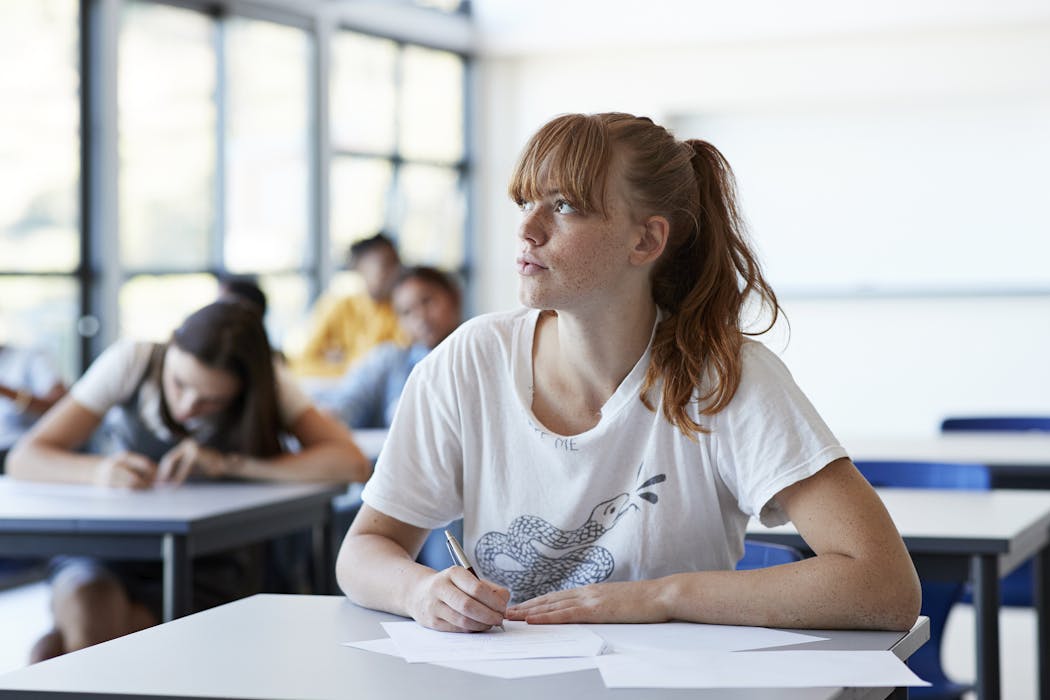
Thousands of Year 12 students across Australia are getting ready to sit their final exams.
Students may be feeling a lot of things right now – from heightened pressure to excitement it will all be over soon. Families may be seeking strategies to help their young people to feel confident and stay calm.
Here are some research-backed strategies to help.
Read more: Take breaks, research your options and ditch your phone: how to take care of yourself during Year 12
Reframe the narrative
Students, schools and the media often talk about Year 12 exams as the culmination of schooling. This may not be helpful to everyone, as not everyone will receive the results they want.
Stress tends to increase throughout the final year of school.
Although a moderate level of stress is normal, and some pressure may even be useful, too much worry about exams can affect performance and overall wellbeing.
Remember, one exam is not the whole story of your ATAR or your future.
It is healthier to think about the bigger picture. Education isn’t just about exams. They are one part of a bigger journey that includes the relationships you’ve formed with peers and teachers, all the things you learned and all the experiences you’ve had.
Students have already achieved a great deal in 13 years of school – regardless of what happens in their exams or ATAR.
What is ‘success’?
In our 2021 study, colleagues and I looked at how different ideas of “success” relate to young people’s wellbeing.
A review of existing studies suggests teenagers who focus on their connections to others and their personal growth may have greater wellbeing than those who focus on “extrinsic” goals or external approval.
Families can help students by emphasising the importance of life beyond the classroom.
You’ve got options!
Keep in mind, your future does not hinge on this result.
There are more alternative pathways into university or further study than ever before. This can include going to TAFE or non-ATAR entry schemes for university.
Reminding yourself – or your child – about these options may help to reduce stress.
Have a clear plan for your exams
As you near the end of your study revision period, think about your plan for certain exams.
You will likely already have done practice exams and revision questions, so you know what format to expect.
Remind yourself when you get into the exam room to take your time to read the instructions carefully and be aware of sections where there is a choice. Pay attention to the weighting of questions as this can help you to plan the time well.
And remind yourself to stop and understand the “command terms”. These are words that tell you what to do in a question, like “analyse”, “compare” or “discuss”.
What if something goes wrong?
You may come out of an exam feeling like you didn’t do your best or something didn’t go to plan. This is very common!
So having a strategy to manage when things do not go well can be important –especially when the setbacks happen early in the exam schedule.
Research tells us planning and persistence are key components of “academic buoyancy”, or students’ resilience in the face of a setback.
This means you should revisit your plan for the next exam, whether it is tomorrow or next week. Plan your timing and approach. Look at any feedback you received on the practice exams, or advice you have received from teachers. Feeling prepared for the next exam will increase your confidence.
Remember, resilience is not just an individual trait: it comes from relationships and contexts too.
You don’t have to handle setbacks alone. In fact, it’s better if you ask for help.
Talking with a trusted friend, teacher, family member or counsellor can put things into perspective or help reframe your approach for the next exam.
Keep some balance in your life
In among your revision and preparation, don’t forget to look after your health.
Get plenty of sleep, eat well, take breaks and spend time in nature – these will all help you maintain focus and wellbeing.
This article is republished from The Conversation, a nonprofit, independent news organization bringing you facts and trustworthy analysis to help you make sense of our complex world. It was written by: Kylie Trask-Kerr, Australian Catholic University and Steven Lewis, Australian Catholic University
Read more:
- We tracked 72,000 NSW public school students over a decade and found 19% had been suspended or expelled
- Australian teachers are some of the highest users of AI in classrooms around the world – new survey
- More and more Australian families are homeschooling. How can we make sure they do it well?
Steven Lewis receives funding from the Australian Research Council.
Kylie Trask-Kerr does not work for, consult, own shares in or receive funding from any company or organisation that would benefit from this article, and has disclosed no relevant affiliations beyond their academic appointment.


 The Conversation
The Conversation
 El Paso Matters
El Paso Matters Ocala Star-Banner
Ocala Star-Banner Magnolia Tribune
Magnolia Tribune America News
America News The Cut
The Cut IMDb TV
IMDb TV AlterNet
AlterNet Axios
Axios KMOV Crime
KMOV Crime